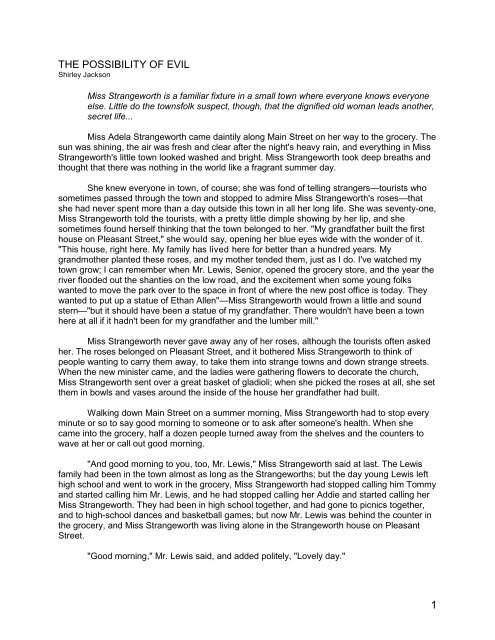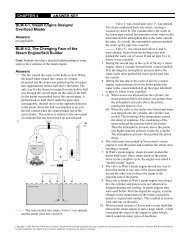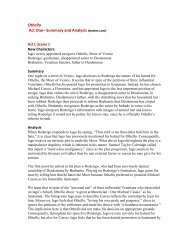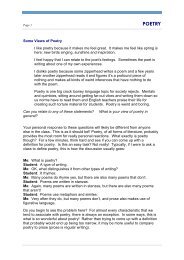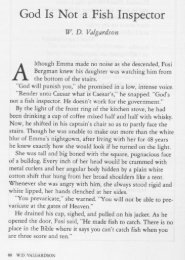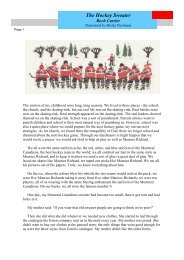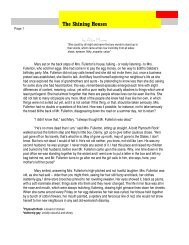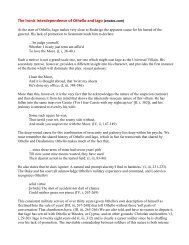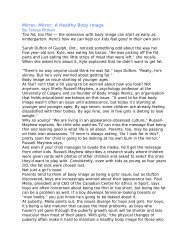The Possibility of Evil
The Possibility of Evil
The Possibility of Evil
Create successful ePaper yourself
Turn your PDF publications into a flip-book with our unique Google optimized e-Paper software.
THE POSSIBILITY OF EVIL<br />
Shirley Jackson<br />
Miss Strangeworth is a familiar fixture in a small town where everyone knows everyone<br />
else. Little do the townsfolk suspect, though, that the dignified old woman leads another,<br />
secret life...<br />
Miss Adela Strangeworth came daintily along Main Street on her way to the grocery. <strong>The</strong><br />
sun was shining, the air was fresh and clear after the night's heavy rain, and everything in Miss<br />
Strangeworth's little town looked washed and bright. Miss Strangeworth took deep breaths and<br />
thought that there was nothing in the world like a fragrant summer day.<br />
She knew everyone in town, <strong>of</strong> course; she was fond <strong>of</strong> telling strangers—tourists who<br />
sometimes passed through the town and stopped to admire Miss Strangeworth's roses—that<br />
she had never spent more than a day outside this town in all her long life. She was seventy-one,<br />
Miss Strangeworth told the tourists, with a pretty little dimple showing by her lip, and she<br />
sometimes found herself thinking that the town belonged to her. "My grandfather built the first<br />
house on Pleasant Street," she would say, opening her blue eyes wide with the wonder <strong>of</strong> it.<br />
"This house, right here. My family has lived here for better than a hundred years. My<br />
grandmother planted these roses, and my mother tended them, just as I do. I've watched my<br />
town grow; I can remember when Mr. Lewis, Senior, opened the grocery store, and the year the<br />
river flooded out the shanties on the low road, and the excitement when some young folks<br />
wanted to move the park over to the space in front <strong>of</strong> where the new post <strong>of</strong>fice is today. <strong>The</strong>y<br />
wanted to put up a statue <strong>of</strong> Ethan Allen"—Miss Strangeworth would frown a little and sound<br />
stern—"but it should have been a statue <strong>of</strong> my grandfather. <strong>The</strong>re wouldn't have been a town<br />
here at all if it hadn't been for my grandfather and the lumber mill."<br />
Miss Strangeworth never gave away any <strong>of</strong> her roses, although the tourists <strong>of</strong>ten asked<br />
her. <strong>The</strong> roses belonged on Pleasant Street, and it bothered Miss Strangeworth to think <strong>of</strong><br />
people wanting to carry them away, to take them into strange towns and down strange streets.<br />
When the new minister came, and the ladies were gathering flowers to decorate the church,<br />
Miss Strangeworth sent over a great basket <strong>of</strong> gladioli; when she picked the roses at all, she set<br />
them in bowls and vases around the inside <strong>of</strong> the house her grandfather had built.<br />
Walking down Main Street on a summer morning, Miss Strangeworth had to stop every<br />
minute or so to say good morning to someone or to ask after someone's health. When she<br />
came into the grocery, half a dozen people turned away from the shelves and the counters to<br />
wave at her or call out good morning.<br />
"And good morning to you, too, Mr. Lewis," Miss Strangeworth said at last. <strong>The</strong> Lewis<br />
family had been in the town almost as long as the Strangeworths; but the day young Lewis left<br />
high school and went to work in the grocery, Miss Strangeworth had stopped calling him Tommy<br />
and started calling him Mr. Lewis, and he had stopped calling her Addie and started calling her<br />
Miss Strangeworth. <strong>The</strong>y had been in high school together, and had gone to picnics together,<br />
and to high-school dances and basketball games; but now Mr. Lewis was behind the counter in<br />
the grocery, and Miss Strangeworth was living alone in the Strangeworth house on Pleasant<br />
Street.<br />
"Good morning," Mr. Lewis said, and added politely, "Lovely day."<br />
1
"It is a very nice day," Miss Strangeworth said, as though she had only just decided that<br />
it would do after all. "I would like a chop, please, Mr. Lewis, a small, lean veal chop. Are those<br />
strawberries from Arthur Parker's garden? <strong>The</strong>y're early this year."<br />
"He brought them in this morning," Mr. Lewis said.<br />
"I shall have a box," Miss Strangeworth said. Mr. Lewis looked worried, she thought, and<br />
for a minute she hesitated, but then she decided that he surely could not be worried over the<br />
strawberries. He looked very tired indeed. He was usually so chipper, Miss Strangeworth<br />
thought, and almost commented, but it was far too personal a subject to be introduced to Mr.<br />
Lewis, the grocer, so she only said, "and a can <strong>of</strong> cat food and, I think, a tomato."<br />
Silently, Mr. Lewis assembled her order on the counter, and waited. Miss Strangeworth<br />
looked at him curiously and then said, "It's Tuesday, Mr. Lewis. You forgot to remind me."<br />
"Did I? Sorry."<br />
"Imagine your forgetting that I always buy my tea on Tuesday," Miss Strangeworth said<br />
gently. "A quarter pound <strong>of</strong> tea, please, Mr. Lewis."<br />
"Is that all, Miss Strangeworth?"<br />
"Yes, thank you, Mr. Lewis. Such a lovely day, isn't it?" "Lovely," Mr. Lewis said.<br />
Miss Strangeworth moved slightly to make room for Mrs. Harper at the counter.<br />
"Morning, Adela," Mrs. Harper said, and Miss Strangeworth said, "Good morning, Martha."<br />
"Lovely day," Mrs. Harper said, and Miss Strangeworth said, "Yes, lovely," and Mr.<br />
Lewis, under Mrs. Harper's glance, nodded.<br />
"Ran out <strong>of</strong> sugar for my cake frosting," Mrs. Harper explained. Her hand shook slightly<br />
as she opened her pocketbook. Miss Strangeworth wondered, glancing at her quickly, if she had<br />
been taking proper care <strong>of</strong> herself. Martha Harper was not as young as she used to be, Miss<br />
Strangeworth thought. She probably could use a good strong tonic.<br />
"Martha," she said, "you don't look well."<br />
"I'm perfectly all right," Mrs. Harper said shortly. She handed her money to Mr. Lewis,<br />
took her change and her sugar, and went out without speaking again. Looking after her, Miss<br />
Strangeworth shook her head slightly. Martha definitely did not look well.<br />
Carrying her little bag <strong>of</strong> groceries, Miss Strangeworth came out <strong>of</strong> the store into the<br />
bright sunlight and stopped to smile down on the Crane baby. Don and Helen Crane were really<br />
the two most infatuated young parents she had ever known, she thought indulgently, looking at<br />
the delicately embroidered baby cap and the lace edged carriage cover.<br />
"That little girl is going to grow up expecting luxury all her life," she said to Helen Crane.<br />
Helen laughed. "That's the way we want her to feel," she said. "Like a princess."<br />
2
"A princess can see a lot <strong>of</strong> trouble sometimes," Miss Strangeworth said dryly. "How old<br />
is Her Highness now?"<br />
"Six months next Tuesday," Helen Crane said, looking down with rapt wonder at her<br />
child. "I've been worrying, though, about her. Don't you think she ought to move around more?<br />
Try to sit up, for instance?"<br />
"For plain and fancy worrying," Miss Strangeworth said, amused, "give me a new mother<br />
every time."<br />
"She just seems-slow," Helen Crane said.<br />
"Nonsense. All babies are different. Some <strong>of</strong> them develop much more quickly than<br />
others."<br />
"That's what my mother says." Helen Crane laughed, looking a little bit ashamed.<br />
"I suppose you've got young Don all upset about the fact that his daughter is already six<br />
months old and hasn't yet begun to learn to dance?"<br />
"I haven't mentioned it to him. I suppose she's just so precious that I worry about her all<br />
the time."<br />
"Well, apologize to her right now," Miss Strangeworth said. "She is probably worrying<br />
about why you keep jumping around all the time." Smiling to herself and shaking her old head,<br />
she went on down the sunny street, stopping once to ask little Billy Moore why he wasn't out<br />
riding in his daddy's shiny new car, and talking for a few minutes outside the library with Miss<br />
Chandler, the librarian, about the new novels to be ordered and paid for by the annual library<br />
appropriation. Miss Chandler seemed absentminded and very much as though she were<br />
thinking about something else. Miss Strangeworth noticed that Miss Chandler had not taken<br />
much trouble with her hair that morning, and sighed. Miss Strangeworth hated sloppiness.<br />
Many people seemed disturbed recently, Miss Strangeworth thought. Only yesterday the<br />
Stewarts' fifteen-year-old Linda had run crying down her own front walk and all the way to<br />
school, not caring who saw her. People around town thought she might have had a fight with<br />
the Harris boy, but they showed up together, at the soda shop after school as usual, both <strong>of</strong><br />
them looking grim and bleak. Trouble at home, people concluded, and sighed over the problems<br />
<strong>of</strong> trying to raise kids right these days.<br />
From halfway down the block Miss Strangeworth could catch the heavy scent <strong>of</strong> her<br />
roses, and she moved a little more quickly. <strong>The</strong> perfume <strong>of</strong> roses meant home, and home<br />
meant the Strangeworth House on Pleasant Street. Miss Strangeworth stopped at her own front<br />
gate, as she always did, and looked with deep pleasure at her house, with the red and pink and<br />
white roses massed along the narrow lawn, and the rambler going up along the porch; and the<br />
neat, the unbelievably trim lines <strong>of</strong> the house itself, with its slimness and its washed white look.<br />
Every window sparkled, every curtain hung stiff and straight, and even the stones <strong>of</strong> the front<br />
walk were swept and clear. People around town wondered how old Miss Strangeworth<br />
managed to keep the house looking the way it did, and there was a legend about a tourist once<br />
mistaking it for the local museum and going all through the place without finding out about his<br />
mistake. But the town was proud <strong>of</strong> Miss Strangeworth and her roses and her house. <strong>The</strong>y had<br />
all grown together.<br />
3
Miss Strangeworth went up her front steps, unlocked her front door with her key, and<br />
went into the kitchen to put away her groceries. She debated about having a cup <strong>of</strong> tea and then<br />
decided that it was too close to midday dinnertime; she would not have the appetite for her little<br />
chop if she had tea now. Instead she went into the light, lovely sitting room, which still glowed<br />
from the hands <strong>of</strong> her mother and her grandmother, who had covered the chairs with bright<br />
chintz and hung the curtains. All the furniture was spare and shining, and the round hooked rugs<br />
on the floor had been the work <strong>of</strong> Miss Strangeworth's grandmother and her mother. Miss<br />
Strangeworth had put a bowl <strong>of</strong> her red roses on the low table before the window, and the room<br />
was full <strong>of</strong> their scent.<br />
Miss Strangeworth went to the narrow desk in the corner and unlocked it with her key.<br />
She never knew when she might feel like writing letters, so she kept her notepaper inside and<br />
the desk locked. Miss Strangeworth's usual stationery was heavy and creamcolored, with<br />
STRANGEWORTH HOUSE engraved across the top, but, when she felt like writing her other<br />
letters, Miss Strangeworth used a pad <strong>of</strong> various-colored paper bought from the local<br />
newspaper shop. It was almost a town joke, that colored paper, layered in pink and green and<br />
blue and yellow; everyone in town bought it and used it for odd, informal notes and shopping<br />
lists. It was usual to remark, upon receiving a note written on a blue page, that so-and-so would<br />
be needing a new pad soon-here she was, down to the blue already. Everyone used the<br />
matching envelopes for tucking away recipes, or keeping odd little things in, or even to hold<br />
cookies in the school lunchboxes. Mr. Lewis sometimes gave them to the children for carrying<br />
home penny candy.<br />
Although Miss Strangeworth's desk held a trimmed quill pen which had belonged to her<br />
grandfather, and a gold-frosted fountain pen which had belonged to her father, Miss<br />
Strangeworth always used a dull stub <strong>of</strong> pencil when she wrote her letters, and she printed them<br />
in a childish block print. After thinking for a minute, although she had been phrasing the letter in<br />
the back <strong>of</strong> her mind all the way home, she wrote on a pink sheet: DIDN'T YOU EVER SEE AN<br />
IDIOT CHILD BEFORE? SOME PEOPLE JUST SHOULDN'T HAVE CHILDREN SHOULD<br />
THEY?<br />
She was pleased with the letter. She was fond <strong>of</strong> doing things exactly right. When she<br />
made a mistake, as she sometimes did, or when the letters were not spaced nicely on the page,<br />
she had to take the discarded page to the kitchen stove and bum it at once. Miss Strangeworth<br />
never delayed when things had to be done.<br />
After thinking for a minute, she decided that she would like to write another letter,<br />
perhaps to go to Mrs. Harper, to follow up the ones she had already mailed. She selected a<br />
green sheet this time and wrote quickly: HAVE YOU FOUND OUT YET WHAT THEY WERE<br />
ALL LAUGHING ABOUT AFTER YOU LEFT THE BRIDGE CLUB ON THURSDAY? OR IS THE<br />
WIFE REALLY ALWAYS THE LAST ONE TO KNOW?<br />
Miss Strangeworth never concerned herself with facts; her letters all dealt with the more<br />
negotiable stuff <strong>of</strong> suspicion. Mr. Lewis would never have imagined for a minute that his<br />
grandson might be lifting petty cash from the store register if he had not had one <strong>of</strong> Miss<br />
Strangeworth's letters. Miss Chandler, the librarian, and Linda Stewart's parents would have<br />
gone unsuspectingly ahead with their lives, never aware <strong>of</strong> possible evil lurking nearby, if Miss<br />
Strangeworth had not sent letters opening their eyes. Miss Strangeworth would have been<br />
genuinely shocked if there had been anything between Linda Stewart and the Harris boy, but,<br />
as long as evil existed unchecked in the world, it was Miss Strangeworth's duty to keep her town<br />
4
alert to it. It was far more sensible for Miss Chandler to wonder what Mr. Shelley's first wife had<br />
really died <strong>of</strong> than to take a chance on not knowing. <strong>The</strong>re were so many wicked people in the<br />
world and only one Strangeworth left in the town. Besides, Miss Strangeworth liked writing her<br />
letters.<br />
She addressed an envelope to Don Crane after a moment's thought, wondering<br />
curiously if he would show the letter to his wife, and using a pink envelope to match the pink<br />
paper. <strong>The</strong>n she addressed a second envelope, green, to Mrs. Harper. <strong>The</strong>n an idea came to<br />
her and she selected a blue sheet and wrote: YOU NEVER KNOW ABOUT DOCTORS.<br />
REMEMBER THEY'RE ONLY HUMAN AND NEED MONEY LIKE THE REST OF US.<br />
SUPPOSE THE KNIFE SLIPPED ACCIDENTALLY. WOULD DR. BURNS GET HIS FEE<br />
AND A LITTLE EXTRA FROM THAT NEPHEW OF YOURS?<br />
She addressed the blue envelope to old Mrs. Foster, who was having an operation next<br />
month. She had thought <strong>of</strong> writing one more letter, to the head <strong>of</strong> the school board, asking how<br />
a chemistry teacher like Billy Moore's father could afford a new convertible, but, all at once, she<br />
was tired <strong>of</strong> writing letters. <strong>The</strong> three she had done would do for one day. She could write more<br />
tomorrow; it was not as though they all had to be done at once.<br />
She had been writing her letters—sometimes two or three every day for a week,<br />
sometimes no more than one in a month—for the past year. She never got any answers, <strong>of</strong><br />
course, because she never signed her name. If she had been asked, she would have said that<br />
her name, Adela Strangeworth, a name honored in the town for so many years, did not belong<br />
on such trash. <strong>The</strong> town where she lived had to be kept clean and sweet, but people<br />
everywhere were lustful and evil and degraded, and needed to be watched; the world was so<br />
large, and there was only one Strangeworth left in it. Miss Strangeworth sighed, locked her<br />
desk, and put the letters into her big black leather pocketbook, to be mailed when she took her<br />
evening walk.<br />
She broiled her little chop nicely, and had a sliced tomato and a good cup <strong>of</strong> tea ready<br />
when she sat down to her midday dinner at the table in her dining room, which could be opened<br />
to seat twenty-two, with a second table, if necessary, in the hall. Sitting in the warm sunlight<br />
that came through the tall windows <strong>of</strong> the dining room, seeing her roses massed outside,<br />
handling the heavy, old silverware and the fine, translucent china, Miss Strangeworth was<br />
pleased; she would not have cared to be doing anything else. People must live graciously,<br />
after all, she thought, and sipped her tea. Afterward, when her plate and cup and saucer<br />
were washed and dried and put back onto the shelves where they belonged, and her<br />
silverware was back in the mahogany silver chest, Miss Strangeworth went up the graceful<br />
staircase and into her bedroom, which was the front room overlooking the roses, and had<br />
been her mother's and her grandmother's. <strong>The</strong>ir Crown Derby dresser set and furs had<br />
been kept here, their fans and silver-backed brushes and their own bowls <strong>of</strong> roses; Miss<br />
Strangeworth kept a bowl <strong>of</strong> white roses on the bed table.<br />
She drew the shades, took the rose satin spread from the bed, slipped out <strong>of</strong> her<br />
dress and her shoes, and lay down tiredly. She knew that no doorbell or phone would ring;<br />
no one in town would dare to disturb Miss Strangeworth during her afternoon nap. She<br />
slept, deep in the rich smell <strong>of</strong> roses.<br />
After her nap she worked in her garden for a little while, sparing herself because <strong>of</strong><br />
the heat; then she came in to her supper. She ate asparagus from her own garden, with<br />
sweet-butter sauce and a s<strong>of</strong>t boiled egg, and, while she had her supper, she listened to a<br />
5
late evening news broadcast and then to a program <strong>of</strong> classical music on her small radio.<br />
After her dishes were done and her kitchen set in order, she took up her hat—Miss<br />
Strangeworth's hats were proverbial in the town; people believed that she had inherited<br />
them from her mother and her grandmother-and, locking the front door <strong>of</strong> her house<br />
behind her, set <strong>of</strong>f on her evening walk, pocketbook under her arm. She nodded to Linda<br />
Stewart's father, who was washing his car in the pleasantly cool evening. She thought that<br />
he looked troubled.<br />
<strong>The</strong>re was only one place in town where she could mail her letters, and that was<br />
the new post <strong>of</strong>fice, shiny with red brick and silver letters. Although Miss Strangeworth had<br />
never given the matter any particular thought, she had always made a point <strong>of</strong> mailing her<br />
letters very secretly; it would, <strong>of</strong> course, not have been wise to let anyone see her mail<br />
them. Consequently, she timed her. walk so she could reach the post <strong>of</strong>fice just as<br />
darkness was starting to dim the outlines <strong>of</strong> the trees and the shapes <strong>of</strong> people's faces,<br />
although no one could ever mistake Miss Strangeworth, with her dainty walk and her rustling<br />
skirts. <strong>The</strong>re was always a group <strong>of</strong> young people around the post <strong>of</strong>fice, the very youngest<br />
roller-skating upon its driveway, which went all the way around the building and was the only<br />
smooth road in town; and the slightly older ones already knowing how to gather in small groups<br />
and chatter and laugh and make great, excited plans for going across the street to the soda<br />
shop in a minute or two. Miss Strangeworth had never had any self-consciousness before the<br />
children. She did not feel that any <strong>of</strong> them were staring at her unduly or longing to laugh at her,<br />
it would have been most reprehensible for their parents to permit their children to mock Miss<br />
Strangeworth <strong>of</strong> Pleasant Street. Most <strong>of</strong> the children stood back respectfully as Miss<br />
Strangeworth passed, silenced briefly in her presence, and some <strong>of</strong> the older children greeted<br />
her; saying soberly, "Hello, Miss Strangeworth."<br />
Miss Strangeworth smiled at them and quickly went on. It had been a long time since<br />
she had known the name <strong>of</strong> every child in town. <strong>The</strong> mail slot was in the door <strong>of</strong> the post <strong>of</strong>fice.<br />
<strong>The</strong> children stood away as Miss Strangeworth approached it, seemingly surprised that anyone<br />
should want to use the post <strong>of</strong>fice after it had been <strong>of</strong>ficially closed up for the night and turned<br />
over to the children. Miss Strangeworth stood by the door, opening her black pocketbook to take<br />
out the letters, and heard a voice which she knew at once to be Linda Stewart's. Poor little Linda<br />
was crying again, and Miss Strangeworth listened carefully. This was, after all, her town, and<br />
these were her people; if one <strong>of</strong> them was in trouble she ought to know about it.<br />
"I can't tell you, Dave," Linda was saying—so she was talking to the Harris boy, as Miss<br />
Strangeworth had supposed—"I just can't. It's just nasty."<br />
"But why won't your father let me come around anymore? What on earth did I do?"<br />
"I can't tell you. I just wouldn't tell you for anything. You've got to have a dirty, dirty mind<br />
for things like that."<br />
"But something's happened. You've been crying and crying, and your father is all upset.<br />
Why can't I know about it, too? Aren't I like one <strong>of</strong> the family?"<br />
"Not anymore, Dave, not anymore. You're not to come near our house again; my father<br />
said so. He said he'd horsewhip you. That's all I can tell you: You're not to come near our house<br />
anymore." "But I didn't do anything."<br />
"Just the same, my father said . . ."<br />
6
Miss Strangeworth sighed and turned away. <strong>The</strong>re was so much evil in people. Even in<br />
a charming little town like this one, there was still so much evil in people.<br />
She slipped her letters into the slot, and two <strong>of</strong> them fell inside. <strong>The</strong> third caught on the<br />
edge and fell outside, onto the ground at Miss Strangeworth's feet. She did not notice it because<br />
she was wondering whether a letter to the Harris boy's father might not be <strong>of</strong> some service in<br />
wiping out this potential badness. Wearily Miss Strangeworth turned to go home to her quiet bed<br />
in her lovely house, and never heard the Harris boy calling to her to say that she had dropped<br />
something.<br />
"Old lady Strangeworth's getting deaf," he said, looking after her and holding in his hand<br />
the letter he had picked up.<br />
"Well, who cares?" Linda said. "Who cares anymore, anyway?" "It's for Don Crane," the<br />
Harris boy said, "this letter. She dropped a letter addressed to Don Crane. Might as well take it<br />
on over. We pass his house anyway." He laughed. "Maybe it's got a cheque or something in it<br />
and he'd be just as glad to get it tonight instead <strong>of</strong> tomorrow."<br />
"Catch old lady Strangeworth sending anybody a cheque," Linda said. "Throw it in the<br />
post <strong>of</strong>fice. Why do anyone a favor?" She sniffled. "Doesn't seem to me anybody around here<br />
cares about us," she said. "Why should we care about them?"<br />
"I'll take it over anyway," the Harris boy said. "Maybe it's good news for them. Maybe<br />
they need something happy tonight, too. Like us."<br />
Sadly, holding hands, they wandered <strong>of</strong>f down the dark street, the Harris boy carrying<br />
Miss Strangeworth's pink envelope in his hand.<br />
Miss Strangeworth awakened the next morning with a feeling <strong>of</strong> intense happiness, and<br />
for a minute wondered why, and then remembered that this morning three people would open<br />
her letters. Harsh, perhaps, at first, but wickedness was never easily banished, and a clean<br />
heart was a scoured heart. She washed her s<strong>of</strong>t old face and brushed her teeth, still sound in<br />
spite <strong>of</strong> her seventy-one years, and dressed herself carefully in her sweet, s<strong>of</strong>t clothes and<br />
buttoned shoes. <strong>The</strong>n, coming downstairs and reflecting that perhaps a little waffle would<br />
be agreeable for breakfast in the sunny dining room, she found the mail on the hall floor<br />
and bent to pick it up. A bill, the morning paper, a letter in a green envelope that looked<br />
oddly familiar. Miss Strangeworth stood perfectly still for a minute, looking down at the<br />
green envelope with the pencilled printing, and thought: It looks like one <strong>of</strong> my letters. Was<br />
one <strong>of</strong> my letters sent back? No, because no one would know where to send it. How did<br />
this get here?<br />
Miss Strangeworth was a Strangeworth <strong>of</strong> Pleasant Street. Her hand did not shake<br />
as she opened the envelope and unfolded the sheet <strong>of</strong> green paper inside. She began to<br />
cry silently for the wickedness <strong>of</strong> the world when she read the words: LOOK OUT AT<br />
WHAT USED TO BE YOUR ROSES.<br />
7


